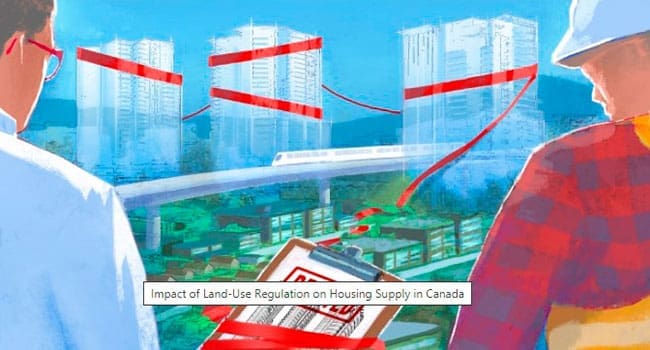By Ken Green
Ian Herzog
and Josef Filipowicz
The Fraser Institute
House prices have grown substantially in recent years, especially in Canada’s biggest cities. Many Canadians are concerned about this trend, and a number of solutions have been proposed.
However, many of these solutions are unlikely to be effective. Taxes on luxury properties might be an easy source of revenue, but likely won’t have a profound effect on the entire housing market. Targeting dishonest realtors can improve confidence in the market, but fraud and flipping are more likely to follow high prices than cause them. It’s tempting to argue for curtailing immigration and foreign investment, but this would be hard to do without harming the many sectors of our economy that depend on investors and immigrants for growth. Indeed, focusing on small pieces of the housing market is unlikely to reduce prices because, ultimately, price growth is the result of supply and demand.
But regulatory reform – simplifying the processes of obtaining building permits where housing demand has grown – can reduce homebuilding costs, increase the number of homes on the market, and subsequently push down home prices.
Housing tends to be less scarce, and less expensive, in markets where homebuilders are less constrained by geography or regulations. For example, Houston, Texas has managed to remain affordable in spite of an economic boom, partly because its geography and regulations make homebuilding easier.
Closer to home, a new study by the Fraser Institute found evidence that regulations causing long and unpredictable approval timelines for homebuilders have substantially reduced the amount of housing available in Canada’s biggest cities. This is because these regulations make it more difficult, and less likely, for the housing supply to respond to demand with homebuilding.
The study also suggests that relaxing and reforming the right regulations can actually encourage greater urban density, a stated goal of many local and provincial governments. This is largely because opposition to new building, long development approval timelines, and uncertainty tend to be especially problematic in cities near metropolitan cores, where demand is strongest. So people who might prefer to live centrally end up commuting to Vancouver from Langley, to Calgary from Cochrane, or to Toronto from Brampton.
Reforming regulations to encourage new building won’t be easy. It will take careful thought and ambitious reform for city planners to cut months off approval timelines, or make these timelines more predictable. But it can be done. In fact, our data show large differences in regulation between relatively comparable cities. Policymakers can look to their neighbours to find policies that might improve regulatory processes.
Still, it’s true that a growing housing supply means that some neighbourhoods change, and that some open fields become housing developments, but the benefits outweigh these costs. Municipal governments can address anti-growth pressures, streamline approvals, and mitigate uncertainty in residential development without compromising good planning. The additional homebuilding that would follow can provide good jobs while addressing rising house prices.
It’s also important for policymakers to reconsider low-density zoning and provincial policies aimed at preserving rural areas such as Ontario’s Greenbelt and B.C.’s Agricultural Land Reserve. These policies effectively take land off the table for would-be homeowners, with severe side-effects. Development in Greater Vancouver has leapfrogged over parts of the Agricultural Land Reserve, leaving many to commute through patches of farmland cutting through Vancouver’s suburbs.
Despite these challenges, city governments hold a policy lever that can help address unaffordable housing. They can encourage more supply and improve affordability, without compromising good planning, by carefully rethinking land-use regulations.
Ken Green, Ian Herzog and Josef Filipowicz are analysts at the Fraser Institute.
Ken, Ian and Josef are Troy Media contributors. Why aren’t you?
The views, opinions and positions expressed by columnists and contributors are the author’s alone. They do not inherently or expressly reflect the views, opinions and/or positions of our publication.





